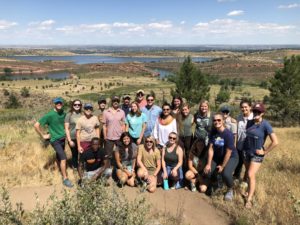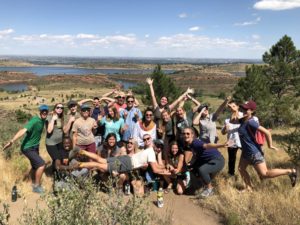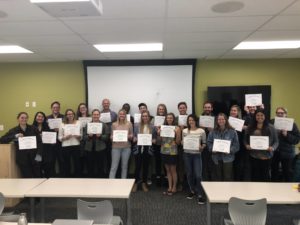CCC Teaches Collaborative Conservation to Tomorrow’s Conservation Leaders
Each spring, Dr. Kim Skyelander, CCC Associate Director, teaches the three credit course Collaborative Conservation: NR543B for the Conservation Leadership Through Learning (CLTL) program, a master’s degree in the Department of Human Dimensions of Natural Resources at CSU. The CLTL program prepares the next generation of conservation leaders to address complex conservation issues at local, regional, and global scales. The program is built around principles of experiential learning, interdisciplinary instruction, and applied approaches which value cross-cultural and inter-disciplinary perspectives. Although CLTL has been awarding degrees for less than a decade, CLTL alumnae are already leading conservation efforts across the Americas and as far away as New Zealand.
The Collaborative Conservation course focuses on analyzing conservation issues from multiple disciplines and stakeholder perspectives, and teaches students how to collaborate with diverse stakeholders and individuals.
Students become familiar with:
- The cultural, historical, ecological, and theoretical underpinnings of collaborative conservation processes
- Different kinds of collaborate efforts
- The key elements of and challenges to the successful practice of collaborative conservation
Students receive hands-on experience in:
- Collaborative conservation skills and tools
- Interviewing and qualitative data analysis
- Critically analyzing and assessing a collaborative initiative by developing a comprehensive situation assessment report which is given to the collaborative.
This spring, students will be working with partners doing on-the-ground conservation to conduct a Situation Assessment to get a detailed understanding of specific conservation initiatives. Their conservation partner organizations include the Big Thompson Watershed Coalition, Poudre Valley Community Farms, Colorado Forest Restoration Institute, Chama Peak Land Alliance, and the San Juan Headwaters Forest Health Partnership.
Besides teaching, Kim is also the major advisor for 3 CLTL student Capstone Projects this year. Dr. John Sanderson, CCC Director, will be advising an additional CLTL student. CLTL is an 18-month graduate program, which includes two semesters of full-time coursework followed by a Capstone Project. The Capstone Project gives students the opportunity to apply their skills and knowledge to a real conservation issue by working with a community partner to develop a project deliverable – such as a management plan, communication plan, or a pilot program to help the organization. Kim’s students will be: creating an outdoor environmental education program for a museum, developing a site monitoring plan and multi-cultural engagement program for a nature center, and investigating how Iowa farmers use social networking to determine their attitudes towards conservation. John’s student will be researching the effects of forest management strategies on the forest hydrology of the Front Range.




